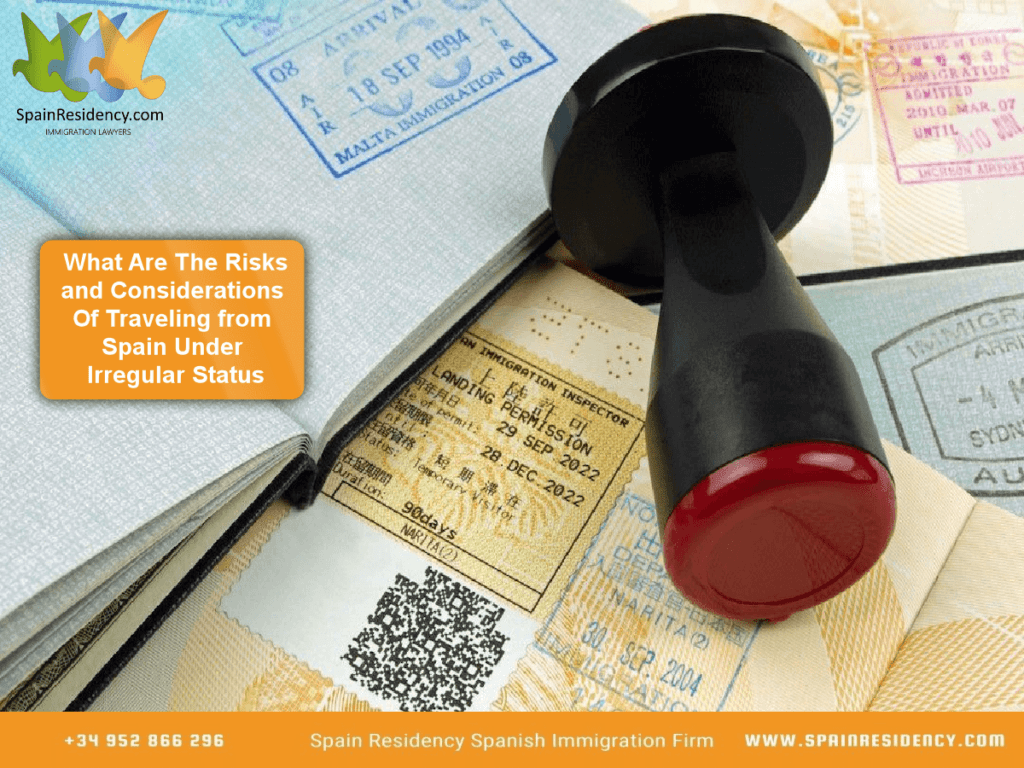Many foreigners find themselves in Spain with an irregular status, lacking a valid residence and work permit here we discuss traveling from Spain under an irregular status. This situation arises when their residence permit expires and they cannot renew it or when they enter as tourists while awaiting arraigo.
The possibility of traveling outside Spain while in an illegal situation raises several questions. Are there any risks or penalties associated with leaving? Can one travel within Spain without a valid residence permit?
This article aims to provide comprehensive answers to these crucial inquiries, shedding light on potential risks that individuals should be aware of before making any decisions.
Menu:
In this post we cover the following: (click any section to see its content)
- LEAVING SPAIN UNDER AN IRREGULAR SITUATION
- RE-ENTERING SPAIN AFTER LEAVING UNDER AN IRREGULAR STATUS
- TRAVELING WITHIN SPAIN WITHOUT A VALID RESIDENCE PERMIT
- TRAVELING THROUGH EUROPE UNDER AN IRREGULAR STATUS
- WHAT IS IMPORTANT TO REMEMBER
LEAVING SPAIN UNDER AN IRREGULAR SITUATION:
The first crucial point to clarify is that voluntarily leaving Spain while in an irregular situation, such as returning to one’s country of origin, does not entail any problems. The police will not stop anyone at the airport in such a scenario. Departing Spanish territory under these circumstances does not attract fines, sanctions, or a prohibition of re-entry. It is a free and unobstructed choice.
However, when intending to travel to another country, individuals must consider the requirements of that specific destination. If the country in question demands a visa, the application will likely be denied due to the individual’s irregular situation in Spain. Consequently, one’s ability to travel may depend on the destination country’s regulations.
RE-ENTERING SPAIN AFTER LEAVING UNDER AN IRREGULAR STATUS:
Leaving Spain voluntarily while in an irregular situation poses no problems regarding fines or sanctions. However, when one’s passport is stamped, indicating the individual’s previous irregular status in Spain, re-entry may become challenging. The stamped passport raises awareness of the irregular status, complicating re-entry or visa applications for short stays, such as Schengen tourist visas.
To facilitate re-entry after leaving Spain under an irregular status, applying for a regular residence permit from one’s country of origin may be the optimal solution. Nevertheless, this option may not be viable if there is an existing expulsion order or entry ban.
TRAVELING WITHIN SPAIN WITHOUT A VALID RESIDENCE PERMIT:
Strictly according to the law, individuals in an irregular situation are not permitted to move within Spain freely. The right to free movement within Spanish borders is exclusively granted to Spanish nationals and foreigners with valid residence permits. In practice, however, moving and traveling within Spain is relatively straightforward, as border controls are rarely encountered.
While internal travel is feasible, individuals must exercise caution, as police checks for documents could occur. Failure to demonstrate valid documents during such checks could lead to an expulsion order and sanctions. It is advisable for those in an irregular situation to control their movements as much as possible and endeavour to secure residency in the country.
TRAVELING THROUGH EUROPE UNDER AN IRREGULAR STATUS:
Spain is part of the Schengen area, encompassing many European countries. This vast territory allows for the free movement of people between participating nations. Although individuals in an irregular situation can travel within Europe without encountering checks for valid documents or Spanish residency, caution is essential.
The immigration laws in each country differ, and certain countries may issue expulsion orders if irregular status is detected upon exit or conduct frequent routine checks. Consequently, it is prudent for those with an irregular status to avoid traveling within Europe to avert potential issues.
IN CONCLUSION IT IS IMPORTANT TO REMEMBER:
Leaving Spain voluntarily while under an irregular status does not attract penalties or fines. However, individuals must be mindful of potential challenges when re-entering the country due to stamped passports. Traveling within Spain, although feasible, necessitates caution during potential police checks. Moreover, traveling within Europe under an irregular status may carry risks, given varying immigration laws. In light of these considerations, it is crucial for individuals to understand the potential ramifications and make informed decisions to navigate their situations effectively.
The options for residency in Spain for Non-Europeans can be seen-here.
Please see-here our video-blog with options and legal-advice to obtain residency in Spain.
Would you like assistance with your Residency Application in Spain?
We are a Spanish Solicitor and assist our clients with all types of residency applications.
Permanent residency is obtained after 5 years of Spanish Residency through Self-Employed Residency, Digital-Nomad, Non-Lucrative Residency or Golden-Visa. This followed by 5 years as a permanent resident in Spain and means you can then obtain Spanish Citizenship with a Spanish Passport.


